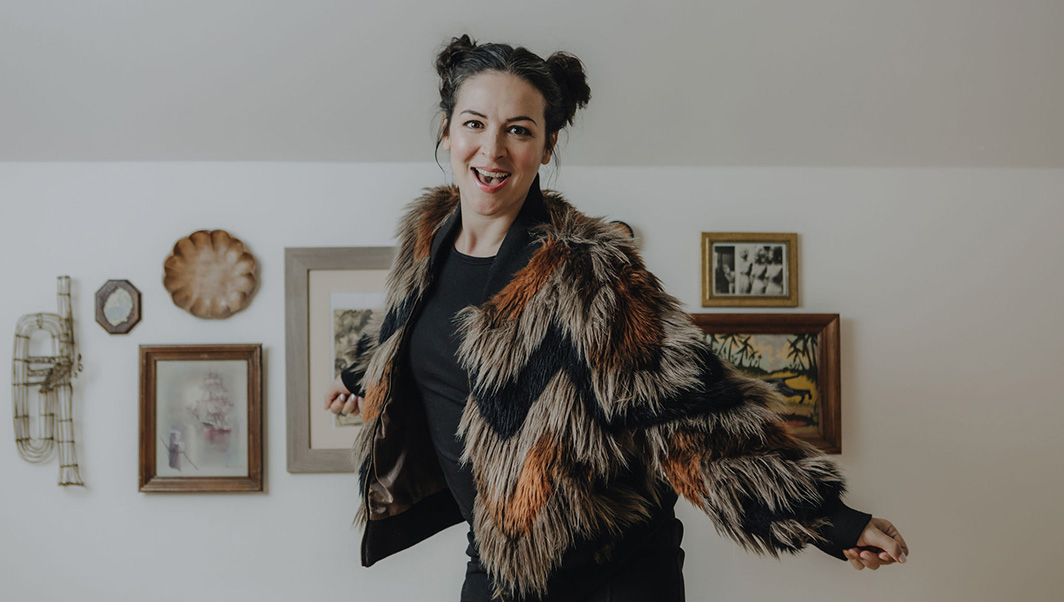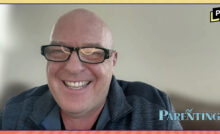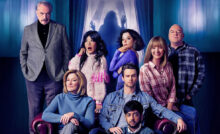Exclusive Interview: Jaime Andrews Opens Up About ‘The Brink’ Memoir, Overcoming Adversity, and Crafting a Future Beyond Her Past


Jaime Andrews is a versatile artist known for her powerful performances across various mediums. She’s garnered acclaim for her role as a comedic commentator on TruTV’s World’s Dumbest, graced billboards as a model for Stoli, and earned accolades as an award-winning filmmaker for Division.
Her latest work, The Brink, is a deeply personal memoir that explores Jaime’s troubled adolescence. It chronicles her journey through depression, promiscuity, drug use, and institutionalization—all before the age of eighteen. Through her candid storytelling, Jaime invites readers to contemplate the trials of youth and the potential for personal growth and resilience.
Pop Culturalist had the privilege of interviewing Jaime about The Brink, delving into her incorporation of humor during challenging moments, the significance of self-love and kindness, her journey from survival to empowerment, and more.
PC: There was a point in the process of writing The Brink when you considered publishing this memoir anonymously because you didn’t want it to affect the other areas of your career. You wrote this almost twenty years ago. What was that turning point for you? Given that we’re living in the digital age where there’s an unparalleled level of access, for better or worse, have you seen the impact that your words have had on others?
Jaime: I have, particularly from my uncle. He’s a teacher. He said this would be so important for young people to read to navigate all the pitfalls they can come across in their lives. That’s what made me think that I did the right thing and that this could make a difference.
But yes, as you said, there is an unprecedented amount of access. We’re all kind of open books now, so I thought I’d literally open the book.
I had just finished my film, Division. It had been put out in the world. I was like, “What am I going to do next?” I had all these other ideas, but this was something that I had almost ready. I gave it a brush up. It was really the need to feel like I was accomplishing something. [laughs]
PC: There’s also so much vulnerability as well as courage that you have to tap into when you’re recounting these experiences in your life and the person that you used to be. Was it ever a scary prospect? Was there a story that you were on the fence about including?
Jaime: That’s a really good question. I do lay all things bare in the book. I was most concerned about all the sexual stuff because I know it’s what bothers my mom the most. She wanted nothing to do with this book. She’s lived it the first time. In Division, which is also very much based on my life too, I ask in one part, “How were you a bad kid?” I said, “Lying, cheating, stealing, drugs—all the good stuff.” My mom was like, “I’m glad that you didn’t say sex.” [laughs] Like what? Everything else is okay to mess around with, but nobody should know that I wasn’t a proper lady at all times. But that’s what kids are dealing with. That’s what she dealt with. We’re getting away from such prudish strictures on women, especially, thankfully.
PC: At least now we know what’s off-limits for your mom. [laughs] You’ve been able to recount these events with so much levity and humor, which feels so authentic to you, and it feels very slice of life. As you were writing this, did you find that those moments found themselves? Was that balance something that you were mindful of as you were penning it?
Jaime: You absolutely nailed it. They found themselves. I’ve always had gallows humor. In confronting the darkness of life, I always make a joke of it because that’s the only way I know how to get by. So I wasn’t trying to be like, “I should put a joke here.” It was like, “This is what happened, and here’s my joke about it.” [laughs] It came very naturally, as you said.
PC: You’ve also said in previous interviews that you don’t recognize the person who is in this memoir. If you could share advice with your younger self, what would it be and why?
Jaime: Love yourself. I would tell that to everybody if I could, especially young women. Study harder; school’s important. That would have been good. Stay away from drugs and boys. Boys are a waste of time. If I had one thing to tell her, I would tell her five things, as I just did.
PC: You’re incredible. You also recorded the audiobook for this. What was that experience like? I imagine it’s one thing to write about this twenty years ago, and it’s another to share these stories through spoken word.
Jaime: That was so much fun because my husband is actually an audiobook narrator, so we have a recording booth in our basement. There’s no excuse for me not to do it, especially because he knows how to do all the editing and sound processing that would totally escape me. I had so much fun with it. I’ve tried to get into doing audiobooks with him, and I hated being in that booth, but it turns out when it’s my own story, it’s actually really fun. I really tore through it because to experience those things again and tell that story, it affected me. It was an emotional experience, but it was really satisfying too.
PC: It’s such a beautiful journey that you take readers on from surviving to thriving. What do you hope they take away after they pick up this memoir?
Jaime: Thank you so much. That’s really nice to hear. I hope that people take away from this that no matter what has been in their past, they can make something out of their future.
PC: You’ve also started writing the sequel to The Brink. What did you learn from writing this first memoir that you’re going to be able to apply to Further? Is there anything you can tease about it?
Jaime: The sequel to The Brink is called Further because, as shocking as it may be, I do go further out on the brink. There’s hope, but in the preface, I talk about how things got even worse than they are. There’s still hope at the end of the first book, but I was in no position to go off to college. This is that story. But it’s also the story of me through my family, through my passion for acting, getting back on my feet, and the lessons that I started to learn in my life. Although there might be a third book. I initially sat down to write my whole story, but I had 300 pages and I wasn’t even to college. I think this is Part A.
PC: You’ve also written and produced. Are there any plans to potentially adapt this memoir to a different medium, maybe on screen or through a television series?
Jaime: I have a friend who would like to make it into a series. I’d love to develop it that way. I have a screenplay based on some of the more harrowing parts of it. It’s called The Brink. That’s ready to go, but a series probably makes more sense because there’s so much in there. It would be a shame to leave stuff out.
PC: You’ve also said in the past that the people closest to you have learned new things about you. Having read this memoir, what are those conversations that you’ve had with them? Have you found that those relationships have strengthened as a result of releasing this book?
Jaime: So much of my community is still in Los Angeles. I’ve been doing readings, and that’ll be an interesting way to connect more with the audience. But mostly, I’ve heard from people that I was really naughty and that I was really bad. [laughs] I think that’s surprising because I come off as straitlaced. People were really shocked, but I have heard from people that I went to high school with who said they didn’t realize I was going through this and how it’s amazing I’m here. That’s been kind of heavy.
PC: It’s a testament to you and the human spirit. Outside of this memoir, you’re also a multifaceted talent. How did you discover your passion for the arts and storytelling?
Jaime: Thank you for saying that. You’re very kind. I grew up doing it. It was so natural. It was from day one. In kindergarten, I led that play. I led the first-grade play. If they needed someone to go on stage, they’d be like, “Get Jaime.” I even wrote poetry in elementary school. It was bad. I’m not going to lie. I wasn’t a young genius in poetry. [laughs] But then I wrote a TV episode, sort of. It was a TV/movie when I was in junior high school. I wish I had followed through more on writing because I didn’t rediscover writing until later. I was really focused on acting, which has been great. I’ve been very fortunate to have the career that I’ve had.
PC: Who or what has had the biggest influence on your career, either personally or professionally?
Jaime: I’ve always thought I wanted a mentor. I wonder what my career path would have been like if I had someone guiding it. I lost my sister when I was twenty-four, and she was thirty. She was that for me when I was a bad kid.
She didn’t literally smack me around, but she was like, “What are you doing?” When I got back on the path, she was my biggest cheerleader. A lot of the family didn’t take it seriously. They were like, “Sure, she’s an actress…what are you really going to do?” But she was so supportive of that, so I’ve really missed that.
So I would say she’s been a huge influence. I’ve had a lot of projects after she passed that have had weird ties to her. It’s been magical. I feel like losing someone close to you makes you think a lot more about the afterlife. I hope there is one because I like to think she’s like, “Yeah, you did those things.”
PC: You’re honoring her through your work. This is one of the most challenging industries to be a part of. Despite that, you’ve had so much success. When you look back, is there a moment that stands out? During those more challenging times, how have you been able to persevere?
Jaime: It’s not always been easy. Sometimes I wish I had been more appreciative when things really started happening for me and been able to capitalize on them more because it’s a kind word or here, like the kind things that you’ve said, that’s what keeps me going. I know it should be inside and not from outside gratification, but we’re artists and we do need feedback to keep going.
When I wrote my play, it was part of this comedy series, but it wasn’t really right for that. But someone was like, “You got to keep writing that play.” That was such a catalyst for me to start writing again. Never hold back from telling someone a supportive word because you never know where they are at and how much it could mean to them.
PC: I love that. Art is supposed to be entertaining, but this memoir is really going to impact so many people’s lives. You were talking about this earlier, but you also have a film out, Division, which you wrote, produced, and starred in. Can you tell us a bit about the inspiration behind that story and how have your experiences behind the camera impacted the way that you approach your work on-screen as an actress and vice versa?
Jaime: It’s made such a difference in my acting to have that experience behind the camera and know how everything works. It’s so grounding. I’ve felt so good about the work that I’ve done since doing that movie. If I can do that, I can do anything. Being on a big film set is nothing. I did my own film.
The impetus for that was I’m a very politically passionate person, and I was disturbed — I mean, we were all disturbed by the pandemic and the circumstances around the 2020 election. They were frightening to me. I used that as a launching point to tell a personal story, which was me connecting with a fan online and what would happen if it turned out that they did have a connection and it seemed like fate, but they wound up having conflicting politics. Can they come together or are we too far apart?
Make sure to follow Jaime on Twitter and Instagram. Pick up your copy of The Brink today.
Photo Credit: Stacey Bode // Hair and Makeup: Jacque Carder
Recent Posts
Win Tickets to a NYC Screening of A Working Man
Pop Culturalist is excited to be partnering with Amazon MGM Studios to give away tickets…
Exclusive Interview: How The Parenting’s Dean Norris Took That Scene to the Next Level
Craig Johnson’s The Parenting delivers the perfect blend of horror and hilarity, turning a classic…
Exclusive Interview: Director Craig Johnson and Writer Kent Sublette on Balancing Horror, Comedy, and Heart in ‘The Parenting’
Meeting the in-laws is stressful enough—throw in a 400-year-old poltergeist, and things go completely off…
SXSW 2025: Florence Hunt and Rory Walton-Smith on ‘Mix Tape,’ First Love, and Their Artistic Process
First love is unforgettable. It leaves an imprint, shaping the way we see the world,…
SXSW 2025: Why ‘F*ckUps Anonymous’ Is More Than Just a Show—Joe Tierney, Katrina Whalen, Sarah Jeffery & Andrew Michael Fama on Giving a Voice to the Voiceless and the Power of Storytelling
Television has the power to do more than entertain—it can challenge, heal, and transform. Some…
SXSW 2025: Siobhan McCarthy, Misha Osherovich, and Nico Carney on Reclaiming Comedy Classics with Trans Inclusion in ‘She’s the He’
Comedy classics like Mean Girls, She’s the Man, and Clueless have shaped generations with their…



View Comments
i enjoyed reading this interview. i also wrote a memoir and it is also about my troubled youth wat before jamies. deugs are not part if it but the other stuff is. drugs weren’t part of our culture until the60s. it is greT to see howadversity becomes the linchpin cor success. yay jamie